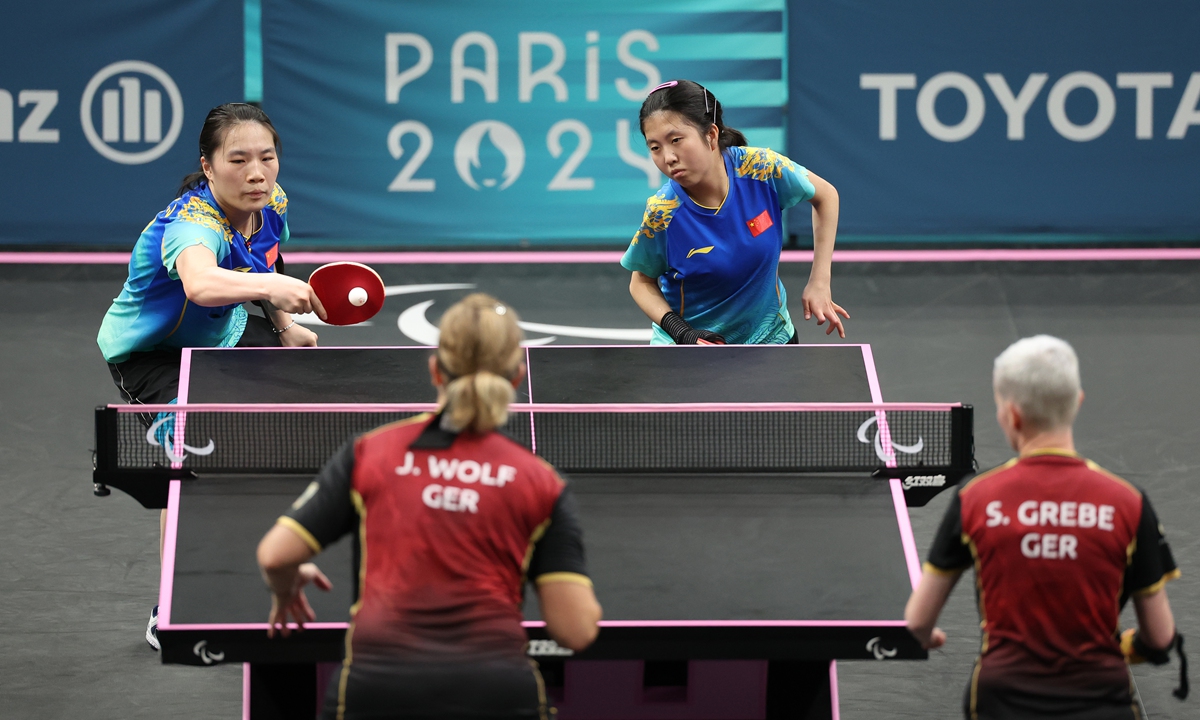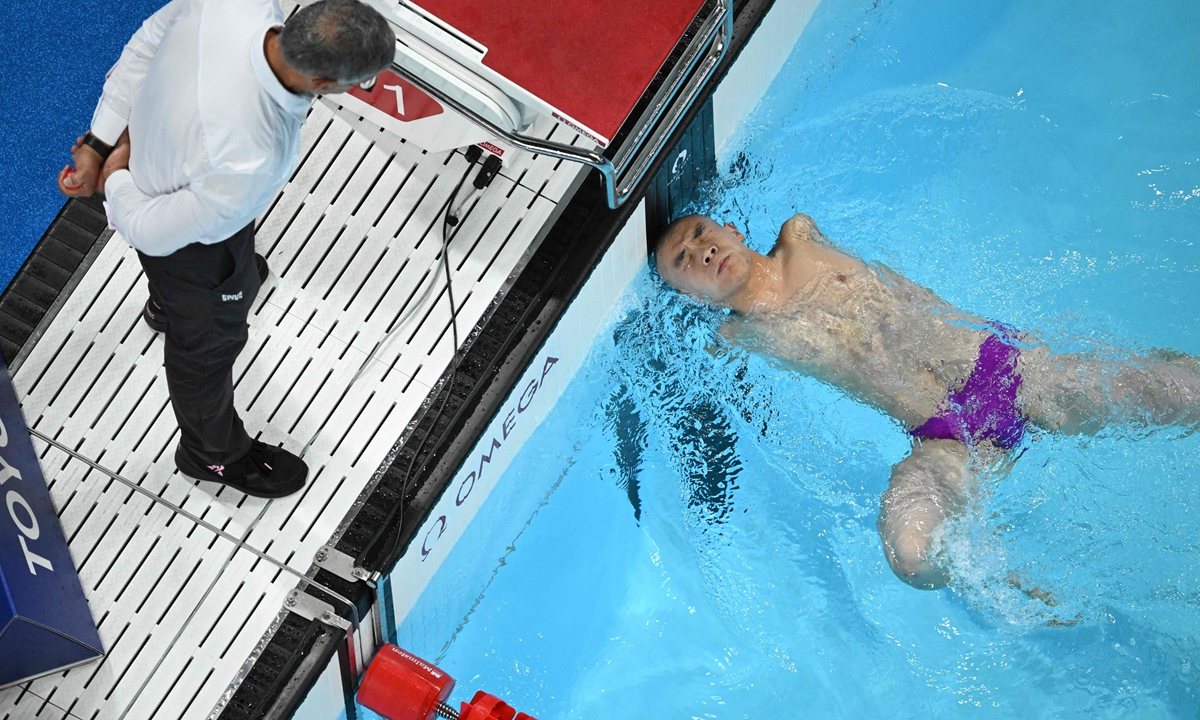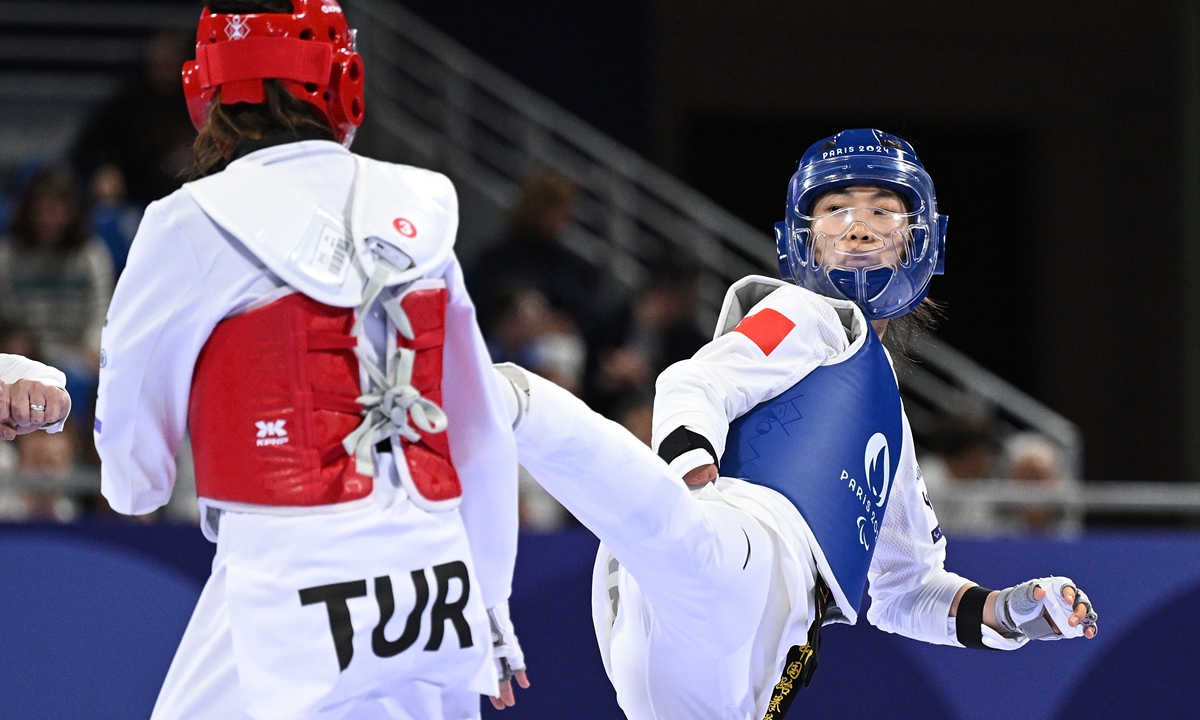
Table tennis players Huang Wenjuan (left) and Jin Yucheng compete during the women's doubles - WD14 gold medal match at the Paris Paralympic Games on August 30, 2024. Photo: VCG
China leads the 2024 Paris Summer Paralympics medal table with 20 gold medals and 42 total medals as of Sunday (local time). Since the end of the second day of competition, Chinese athletes have set six new world records.
Behind every medal won by the athletes is an unyielding and inspiring story, and more importantly, a persistent pursuit of their dreams.
"The greatness of the Paralympic athletes lies in their extraordinary perseverance and resolve in the face of physical challenges. Their stories inspire the world, demonstrating the limitless potential of human capability," Luo Le, a sports scholar at the Beijing University of Chemical Technology, told the Global Times.
In the swimming events, Chinese swimmer Guo Jincheng competed in three consecutive finals. After winning a silver medal and breaking the Asian record in the men's S5 100m freestyle final, he and his teammates netted a gold medal in the mixed 4x50m freestyle relay final, fulfilling his Paraympic gold medal dream.
During the training period for the Paris 2024 Paralympics, Guo intensified his training with each session exceeding 10,000 meters in the pools. "Despite the high intensity, he never complained of fatigue. I know it's the dream of the Paralympics that motivates him," said Liu Zhenzhai, Guo's coach.
"To practice breath-holding, I pushed myself to the limit each time, often until nearly suffocating before taking a breath," Guo said.
He practiced breathing techniques with a basin of water at night after daytime pool sessions, gradually extending his breath-holding time from one minute to nearly two, and reducing his breathing intervals in the pool from three times to once per 50 meters.

Guo Jincheng competes during the men's 100m freestyle - S5 final on August 30, 2024. Photo: VCG
'My own hero'Guo lost both arms in an accident when he was only five years old, but this did not deter him from pursuing his dreams. Since joining the swim team at age 12, Guo has trained nearly every day, dedicating six hours daily to the sport without interruptions. Even after training, he would study videos of top swimmers in the world, in order to improve his own skills in the pool.
Guo has learned to use his feet for tasks typically performed by hand, such as using chopsticks. He said, "What hands can do, feet can do too; what others can do, I can do too. I want to be my own hero."
"Paralympic athletes not only excel in sports but also demonstrate extraordinary spirit in everyday life, facing challenges with courage and a relentless pursuit of self-improvement," Luo noted.
In Para Taekwondo women's K44 -57kg final on Saturday, China's Li Yujie defeated her opponent with a score of 11:0, claiming China's first Paralympic taekwondo gold medal. Like Guo, Li lost her right hand in an accident when she was young.
"I treat every match at the Paralympics as if it's my last, aiming to achieve the results I desire," Li said. Her lifelong passion for sports and rigorous training have led to her outstanding achievements in national and international competitions.
Li previously told the media that she hopes to make more people understand disabled sports and let more people know that disabled people are not a burden but are doing their best to achieve excellence.

Li Yujie competes during the Para Taekwondo women's K44 -57kg final on August 30, 2024 in Paris, France. Photo: VCG
Family support
"Paralympic athletes need targeted training methods and techniques to overcome all kinds of challenges, while maintaining a positive mind-set and strong willpower. Family support, professional coaching, and societal encouragement are key factors in their career success," Luo told the Global Times.
On the Paralympic stage, China's table tennis team remains a "dream team," with 19-year-old Huang Wenjuan and 16-year-old Jin Yucheng winning the gold medal in the women's doubles WD14 class final.
"My partner performed with a 'big heart' today, and I also felt that I achieved that feeling," Huang said in an interview after winning the tough match.
Born with congenital deformities, Jin faced severe disabilities in her limbs and knees. At two years old, she could not even place her feet normally. Her parents sought medical help and she underwent rehabilitation and surgery, enabling her to walk at three years old. To aid her recovery, her mother enrolled her in a local table tennis training program at age 11 and later sent her to a more specialized program in Chongqing at 12.
Despite grueling training that sometimes left her in tears, Jin's mother, Li Xiaoyong, provided unwavering support and encouragement. She helped Jin persist through the challenges of training with a disability, even as her hands developed thick calluses from gripping the paddle. Li Xiaoyong gently encouraged her daughter to persevere, making the sacrifices worthwhile.
This familial support has been a cornerstone of Jin's success. Besides her family, the schools, teachers, and societal support have also played crucial roles. Jin's middle school teacher, Zhu Lin, noted her boundless energy despite her small frame.
Luo concluded that the special athletes, through persistence and effort, have tried to achieve their dreams in adversity.
"Their stories inspire more people with physical disabilities, teaching them not to give up but to bravely pursue their life goals. The positive energy is vital for achieving personal excellence," Luo noted.






